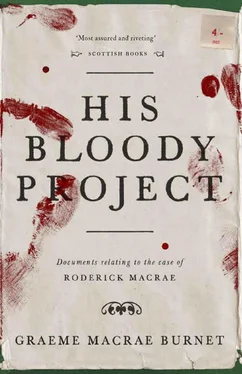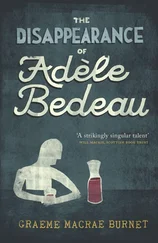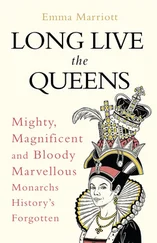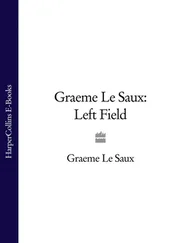Graeme Burnet - His Bloody Project
Здесь есть возможность читать онлайн «Graeme Burnet - His Bloody Project» весь текст электронной книги совершенно бесплатно (целиком полную версию без сокращений). В некоторых случаях можно слушать аудио, скачать через торрент в формате fb2 и присутствует краткое содержание. Год выпуска: 2015, Издательство: Contraband, Жанр: Современная проза, на английском языке. Описание произведения, (предисловие) а так же отзывы посетителей доступны на портале библиотеки ЛибКат.
- Название:His Bloody Project
- Автор:
- Издательство:Contraband
- Жанр:
- Год:2015
- ISBN:нет данных
- Рейтинг книги:5 / 5. Голосов: 1
-
Избранное:Добавить в избранное
- Отзывы:
-
Ваша оценка:
- 100
- 1
- 2
- 3
- 4
- 5
His Bloody Project: краткое содержание, описание и аннотация
Предлагаем к чтению аннотацию, описание, краткое содержание или предисловие (зависит от того, что написал сам автор книги «His Bloody Project»). Если вы не нашли необходимую информацию о книге — напишите в комментариях, мы постараемся отыскать её.
A brutal triple murder in a remote northwestern crofting community in 1869 leads to the arrest of a young man by the name of Roderick Macrae. There’s no question that Macrae is guilty, but the police and courts must uncover what drove him to murder the local village constable.
And who were the other two victims? Ultimately, Macrae’s fate hinges on one key question: is he insane?
His Bloody Project — читать онлайн бесплатно полную книгу (весь текст) целиком
Ниже представлен текст книги, разбитый по страницам. Система сохранения места последней прочитанной страницы, позволяет с удобством читать онлайн бесплатно книгу «His Bloody Project», без необходимости каждый раз заново искать на чём Вы остановились. Поставьте закладку, и сможете в любой момент перейти на страницу, на которой закончили чтение.
Интервал:
Закладка:
I arrived at the gaol somewhat earlier than I had stated, as I wanted first of all to put some questions to the gaoler. This I wished to do outwith the presence of my legal associate, as, in my not inconsiderable experience, those tasked with such menial labour tend to form an allegiance with the first educated man they encounter, in much the same way as an orphaned lamb attaches itself to the first hand that feeds it.
The gaoler closely conformed to the low physical type one routinely finds employed in the prisons and asylums of our land. He was of average height, but broadly built with powerful shoulders and forearms. His complexion was florid and scrofulous; his cranium somewhat mis-shapen, with large protruding ears. His hair was dark and wiry and grew low on his forehead. Likewise, his whiskers grew densely on his cheeks. His visage bore the singularly stupid and insensate look prevalent among those on the opposite side of the cell door, and I would have been not at all surprised to have encountered him there. He was, sans doute , entirely suited to his vocation, but in my present mission I was not looking to him for wit or intellect; he had a pair of eyes in his head, and it was these of which I wished to make use.
The gaoler showed no surprise when I indicated that I did not wish to enter the prisoner’s cell immediately. This class of being exists almost entirely in the present; they think little of the past nor project their thoughts into the future, and are thus incapable of being surprised by anything. They are similarly incapable of experiencing boredom and are accordingly well suited to undemanding and repetitive labour. I led the brute to the end of the passage in order that we would not be overheard by the subject of our conversation. I first ascertained that R— M— had been under the gaoler’s watch since his arrival; and that he was responsible for bringing the prisoner his meals, removing his faecal matter and periodically observing him through the aperture in the door. The gaoler answered my queries with difficulty and I had often to re-phrase them to make myself understood.
I then put a series of questions regarding the prisoner’s behaviour and I here recount the substance of his responses:
The prisoner did not sleep excessively and was at all times alert and aware of his surroundings. He ate with good appetite and had made no plaint about the quality or quantity of his food. Likewise, he had not protested about excessive cold or heat in his cell, nor had he requested extra blankets or other items. He had never enquired about the wellbeing of his family or expressed any curiosity about the outside world. In short, no meaningful discourse had passed between the two men. R— M— was at all times permitted by daylight occupied with the preparation of the papers on his table, but the gaoler had expressed no interest in their contents. The prisoner had not once been seen or heard raving, or calling out as if in thrall to some hallucination. At night he slept soundly and did not appear disturbed by bad dreams or night visions.
At the end of our intercourse, I pressed a shilling onto the palm of the warden’s hand. He gazed stupidly at it for a few moments before pushing it wordlessly into the pocket of his greasy waistcoat. At this moment, Mr Sinclair arrived and appeared quite astonished to find me in congress with the brutish gaoler. Clearly, it had not occurred to him to thus make use of the individual — however limited in intellect — in closest proximity to the prisoner. No doubt, in common with the majority of his brethren in the legal profession, he preferred supposition and conjecture to evidence. I saw no reason to furnish him with an explanation for my actions and he did not have the temerity to question me.
When we entered the cell, R— M— was standing with his back to the wall opposite the door and I suspected that, despite my precautions, the discussion in the passage had alerted him to our presence. As Mr Sinclair had established some bond with the prisoner I allowed him to enter the cell ahead of me and kept my counsel while he engaged in some ludicrous pleasantries. I noted at once that the tray of food which I had requested from the inn had been placed on the floor, next to the writing table. A bowl which appeared to have contained a broth of some kind was empty, but a plate of mutton and potatoes was untouched. Likewise, the bottle of wine remained uncorked.
I asked R— M— in a friendly manner why he had not finished such a hearty meal and he replied that he was not accustomed to rich foods and had eaten an adequate sufficiency. He then added that if I was hungry I was welcome to what was left, an offer I politely declined. Mr Sinclair explained that I wished to put some questions to him and that it would benefit him greatly if he were to answer them fully and truthfully. R— M— replied that he could see no benefit to himself, but if it pleased Mr Sinclair he would answer any question put to him. I sat down on the chair next to the writing table and asked the prisoner to take a seat on his bunk, which he did. Mr Sinclair stood with his back to the door, his hands clasped over his abdomen.
The evidence I had so far gathered — that is, from my physical examination and from my conversation with the gaoler — was not sufficient to draw any conclusions regarding the sanity or otherwise of the accused, nor about his moral responsibility for the crimes he had committed. On a large number of points, he corresponded to the dreary procession of imbeciles who daily passed through my care, but on others, such as his general alertness and ability to apply himself to a task, he did not. I did not for a moment believe that the pages with which he appeared to have been so diligently occupied would contain anything other than gibberish and ravings, but the fact that he had thus applied himself was in itself noteworthy. In my long experience with the criminal classes I have never encountered a single individual capable of any aesthetic appreciation, far less of the production of any literary of artistic work. The literary ambitions of the average prisoner do not extend beyond scratching some vulgar phrases on the wall of his cell. A man of science must, of necessity, keep abreast of the theories and precedents of his chosen field, but he must not allow these theories to blind himself to the evidence of his own eyes, or to dismiss what does not accord with his expectations as aberrant or insignificant. However new and startling any evidence might be, it must be received honestly. As Mr Virchow has stated, ‘We must take things as they really are, and not as we wish them to be.’§§
§§ Rudolf Virchow (1821–1902) was a German scientist known as ‘the father of modern pathology’.
It was quite clear that R— M— was not a raving maniac, the madman of popular imagination, but as has been well-established by Mr Prichard¶¶ and others, there exists another category of lunacy: that of moral insanity , whereby the grossest perversions of the natural impulses, affections and habits can exist with no concomitant disorder of the intellect or reasoning faculties. Certainly, from what I had thus far observed, R— M — exhibited some degree of intelligence, an intelligence which in all probability could only be harnessed to deception or evil ends, but which nevertheless set him apart from the degenerate prototype. It was, therefore, with the intention of exploring the extent of the prisoner’s reasoning faculties that I set about my interrogation.
¶¶ James Cowles Prichard, Treatise on Insanity and Other Disorders Affecting the Mind (1835).
In order to foster the illusion that we were merely two men engaging in conversation, I did not take any contemporaneous notes and this account is based on the record I compiled from memory upon returning to the inn.
Читать дальшеИнтервал:
Закладка:
Похожие книги на «His Bloody Project»
Представляем Вашему вниманию похожие книги на «His Bloody Project» списком для выбора. Мы отобрали схожую по названию и смыслу литературу в надежде предоставить читателям больше вариантов отыскать новые, интересные, ещё непрочитанные произведения.
Обсуждение, отзывы о книге «His Bloody Project» и просто собственные мнения читателей. Оставьте ваши комментарии, напишите, что Вы думаете о произведении, его смысле или главных героях. Укажите что конкретно понравилось, а что нет, и почему Вы так считаете.












